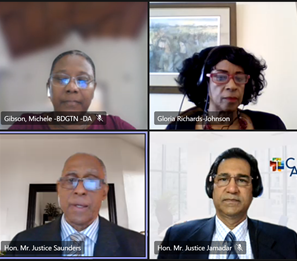The Canadian-funded Judicial Reform and Institutional Strengthening (JURIST) Project has provided much needed Information Technology (IT) equipment to the Caribbean Court of Justice (CCJ) and the Caribbean Association of Judicial Officers (CAJO), to support their regional business continuity efforts during the COVID-19 pandemic.
The virtual handover took place at the start of the Project’s Steering Committee (PSC) meeting, which was held on July 22, 2021 via the Microsoft Teams platform.
Speaking at the handover, the Honourable Mr. Justice Peter Jamadar, Judge, CCJ and Chairman, CAJO, explained that CAJO’s virtual classroom was designed in response to the shifting landscape of adult education delivery, and prompted by COVID-19 restrictions. He said the classroom combines several pieces of technological equipment, to deliver training that transcends the usual virtual learning environment.
This virtual classroom is critical to the CAJO’s innovative and sustainable delivery of judicial education and training across the region. It allows participants to attend and interact with facilitators in a user-friendly setting. It provides a space for facilitators to be interactive and impactful, moving beyond the familiar ‘sitting-in-front-of-the-computer’ method of delivery. Educators can facilitate sessions as if in an in-person classroom – yet virtually. Teaching, learning, and engaged participation are enhanced in virtual settings.
“Thus, the virtual classroom better positions the CAJO to move judicial education boldly forward in sustainable ways. This capacity allows for the CAJO to expand its reach and offer greater opportunities for regional training and education,” he stated.
The CAJO received all equipment in late March, 2021. In May and June 2021, the CAJO deployed its first fully outfitted virtual classroom, funded by the JURIST Project. The virtual classroom was successfully utilised for the CCJ’s 2021 Judicial Training Series.
Ms. Michele Gibson, Senior Development Officer, High Commission of Canada to Barbados, said the handover was a perfect example of a very sound partnership among the CCJ, regional judiciaries, countries and the Government of Canada. She noted that she was
pleased to hear that the virtual classroom was operational and proved critical and functional in its roll out. “We have been able to respond to the many needs of the region during these trying times and I really want to applaud the President and Registrar and CCJ for their leadership on discussions, research and development, to look at the issues and challenges we must face during this time,” she added.
The Honourable Mr. Justice Adrian Saunders, President, CCJ, indicated that while the CCJ has always had to rely heavily on a robust technological infrastructure so as to effectively meet the needs of a geographically dispersed customer base, the onset of the pandemic compelled adjustments to their work methods as judges and staff alike were constrained to work from home.
He continued: “This necessarily required upgraded technology to facilitate the deployment of an entirely virtual courtroom, to cater for full remote work capabilities for the staff, and to enhance the mechanisms and procedures regarding the security of the court’s data.”
Justice Saunders added that the support, provided by the JURIST Project, bolstered the court’s ability to continue to deliver its core and related services reliably and safely during the pandemic. More importantly, it has contributed to the achievement of a strategic goal that the court set for itself, namely enhancing regional justice system capacity and performance.
Both Justice Saunders and Justice Jamadar expressed their sincerest gratitude to the JURIST Project and the Government of Canada who they said have consistently supported their work and that of the judiciaries across the region.
Mrs. Gloria Richards-Johnson, Director, JURIST Project said the Project was all about partnerships and collaboration. “We recognise that without the support of you – our valuable stakeholders within the local jurisdictions where we work, none of our objectives will be achieved. We depend on you to ensure that all initiatives we undertake are sustained long after the Project ends,” she noted.







